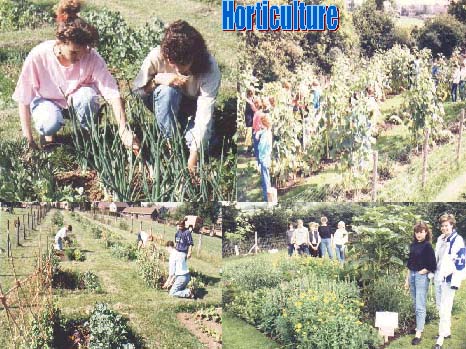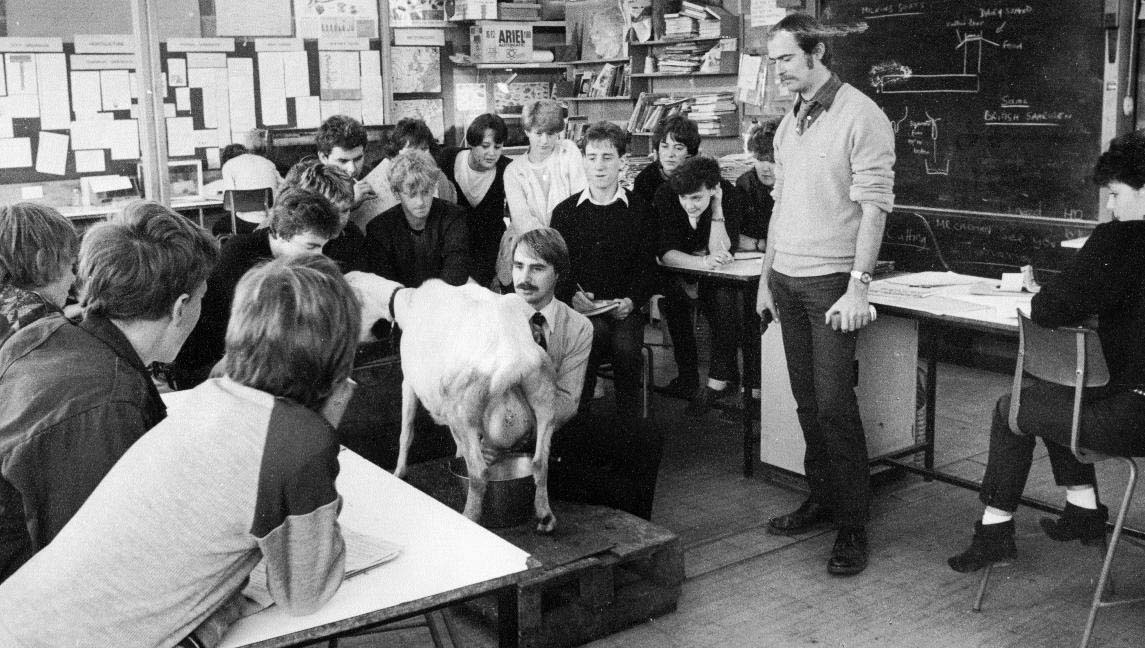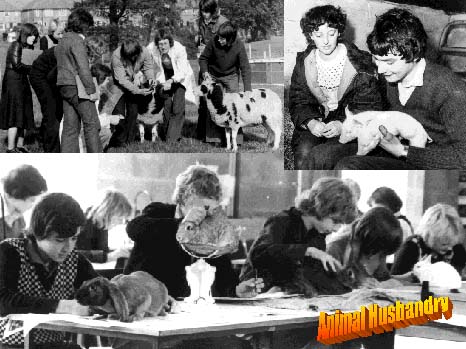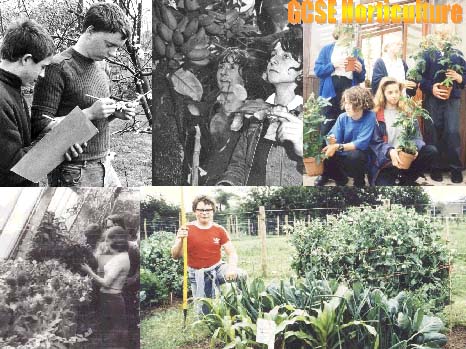

Thank you for all the supportive E-Mails that have been sent to this web site.
Confidentiality will be maintained for those who write, unless requested otherwise.
We have decided to add this second page to make browsing easier.
The picture above has been added in response to the person who wanted protected cultivation to be illustrated, his school has a large investment in greenhouses. Thank you to those of you who have sent in photographs. The pictures on the first page came from just one school, those that follow at the end of this section represent a number of schools. This enables a broader illustration of what is taught in GCSE Agriculture and Horticulture throughout the country.
Many people feel that part of them will die if the subject goes. Several people started teaching Rural Studies and now teach GCSE Agriculture and Horticulture because that is the only subject left that supports their ideals. GCSE Science:Rural is not an alternative for them.
The Moderators, Examiners and their Chair, have put together a paper that has been presented to QCA and AQA, in order to express their view that the syllabus must continue into the future. This document has been placed here in order to keep every one fully informed:
NEAB GCSE AGRICULTURE AND HORTICULTURE
The introduction to the current NEAB syllabus states that it "enables centres to offer their students a course which is essentially practical in nature and which it is hoped will try to allow both those students who have experience only of an urban culture and those involved in a rural environment to increase their awareness of activities carried out in the countryside."
If we are to continue to provide access for students to a learning experience which can deliver these aims then we need to examine what is currently available and make a measured and informed decision as to the best way forward. It seems highly inappropriate for both QCA, and AQA in particular, to consider the reduction of courses available after 2002, without a full consultation which involves the centres and those organisations who have a responsibility to safeguard the rural economy and support countryside matters. This may not be the way in which examinations boards work in rationalising subjects, but in this case there are ramifications far beyond whether there is one syllabus on offer or two!
GCSE Agriculture and Horticulture appears to have come under scrutiny for a number of reasons. First, there is an assumption that the OCR Science: Rural syllabus will suit many centres currently working via NEAB. It should be borne in mind, however, that whilst this syllabus has some superficial similarities to the current Agriculture and Horticulture syllabus, it is far more theoretical in its approach. The OCR syllabus is essentially a Science Key Stage 4 GCSE syllabus and is concerned with delivering Science with a rural flavour. Science: Rural can be studied in a laboratory and does not provide candidates with any meaningful agricultural or horticultural experiences of a practical or theoretical nature. The Science: Rural scheme of assessment reflects its bias and provides motivation only for those candidates and centres who are likely to benefit from and achieve high grades in a final examination weighted at 75%.
The Agriculture and Horticulture syllabus by comparison and contrast is much more practical, has a truly "hands on" approach and is unique among the subjects available within schools. Many students find the traditional approach to science education little suited to their aptitudes and abilities and therefore the current NEAB syllabus offers direct experiences of the environment, encouraging students to accept more readily, rather than reject, scientific study. Second, reference is continually made to the existence of, and continued access to, a GNVQ formerly called Land Based Industries, latterly Land and Environment. There is serious doubt about this GNVQ as it is believed that no assessment structure is actually in place and it is uncertain whether the AQA or any other examination board will be offering it. This means that students currently do not have access to the subject via a known vocational route. This situation will continue to be the case after 2002, unless development work starts in the very near future. GNVQ Horticulture continues, but clearly only covers one area of our current Agriculture and Horticulture syllabus.
There is a very strong body of opinion in this country, which supports the continuance of the current NEAB syllabus, both within and outside the centres. The teachers in the centres, delivering the syllabus over many years, have long recognised its benefits. All of them have worked hard to develop and revise the syllabus to its present highly accessible form. They have also invested tremendous time and energy into developing extensive and costly resources within their schools, with facilities unique to the subject. It must also be stressed that the existence of these facilities benefits the entire school population, stimulating excellent investigative cross-curricular work. When countryside and rural issues are under increasing pressure, and there is a recognisably widening gulf between urban and rural ways of life, it would appear to be more appropriate to support rather than remove a highly effective agricultural and horticultural syllabus. The consequent removal of such educational facilities and opportunities would be seen as a further erosion of the status of rural issues.
In attempting to justify the removal of this syllabus AQA are giving as their reasons the small size of the candidate entry and also that the syllabus lacks depth and breadth. In fact, the subject entry continues to rise in line with the relaxation of National Curriculum c onstraints and it is believed that the syllabus will continue to meet the needs of a range of pupils in school who need a distinctive, practical and highly stimulating area of examination. A considerable proportion of students who study the subject succeed via Agriculture and Horticulture when they fail elsewhere in the curriculum. This phenomenon arises not because the subject is easy, but because it provides motivation for these students in ways in which other, more traditional, subjects fail to do.
The depth of the syllabus is very clear in the specialist areas it covers. It enables students to acquire knowledge and develop a critical understanding of rural and environmental issues today and to assess them objectively. Scientific study within agriculture and horticulture is undertaken on a far larger scale than is usually possible within a science laboratory. The study of plant and animal physiology and biochemistry by observation and experimentation on a whole organism with a view to maximising health, well being and profitability allows students to apply their knowledge, select appropriate strategies for study and evaluate their work very effectively.
The breadth of the subject cannot be in doubt. Examination Board officers have regularly assured the Subject Panel that the syllabus fully meets this requirement. It has major components, the written examination at higher level and the Board-Set Assignment, which demand extended writing. (It has been noted by examiners for both syllabuses that the standard of work submitted for the assignment is often far superior to much of the work presented by candidates entered for Double Award Science.) The current NEAB Agriculture and Horticulture syllabus demands a wide range of practical skills, some of, which are specific to the subject area, but others which would be easily recognisable within any science syllabus. It may sit outside the Science criteria, but it nevertheless incorporates a scientific approach based on hypothesis, practical experiment, result and evaluation.
There is also a wide variety of cross-curricular links. Agriculture and Horticulture utilises Mathematical and English Language skills. However, it is also taught within a Geographical context, exploring issues connected with the location of the centre, the climate, and the problems of communication in the countryside. Additionally the subject has to be set in a Business context in which candidates study the costs of production, the marketing of agricultural and horticultural products and the viability and profitability of enterprises. The implications of membership of the EU and therefore the impact of this on the rural economy have also to be examined. Alongside this, the subject has inseparable links with Technology and ICT, with the need to understand, design and put into practice large scale investigation and problem solving, frequently building and modifying housing and growing environments. Data-logging plays a major role in environmental investigations.
Agriculture and Horticulture is a syllabus which can deliver Key Skills to levels 1 and 2, and with its humanitarian base line provides many openings for developing social consciousness and offers outlets for creative thinking, aesthetic appreciation, linguistic effectiveness and sensitivity. Many of these occur through the care of living things, which can offer the emotional experience many young people need.
It has been demonstrated through the scheme of assessment currently in place that Agriculture and Horticulture is not a narrow and therefore only suited to a vocational route, even if one existed. It should be considered as a full GCSE syllabus, which can be made available up to and beyond 2002. For this reason any decision by QCA and AQA to remove this title from the suite of syllabuses should be re-examined within the time remaining as part of a full comprehensive consultation process.
Mr.C.Monaghan Chair of Agriculture and Horticulture;
Agriculture and Horticulture Examiners and Moderators.
Copies to: - Dr Nick Tate at QCA; NFU; Colin Brill MP; LANTRA; Constituency MPs; Ministry of Agriculture - Mr Nick Brown MP; Countryside Foundation; Ministry of Environment - Mr Michael Meacher MP.
Below is a reply received from Mr. C. J Mitchell at AQA in response to a letter from a headteacher to. Do not accept this as a reply to your letters. Use the information above to respond to to any reply like this:
"Dear Headteacher,
GCSE Agriculture and Horticulture
Thank you for your letter concerning the withdrawl of GCSE Agriculture and Horticulture.
While sympathising with the views that you express and the support that you give to this subject as a GCSE, the regulatory authorities have taken a clear view that this subject is not of comparable depth and range with other GCSE's and would be more suited to an assessment within the vocational area. Indeed QCA has identified a number of Qualifications approved on the section 400 list, which could provide alternative regimes.
AQA have been aware of the view of QCA from the outset of the GCSE revision programme., We have not accordingly made plans to re-develop the existing NEAB scheme and the final examination will therefore be in the Summer 2002.
I hope that your centre will be able to find suitable alternatives. With that in mind I can inform you that Rural Science as a GCSE will continue.
Yours sincerely,
CJ Mitchell
AQA Education Director"
Do not accept the above as a response. Use the facts above the letter to make it clear that GCSE Agriculture does have depth and range. Explain that GCSE Science: Rural is not an acceptable alternative - it is based very much on the Science criteria, has a 75% examination and is narrow compared to GCSE Agriculture and Horticulture. Remember that QCA have quite clearly stated that there is still a consultation period and the above decision is somewhat premature. We must ALL fight on to achieve success in our aims to keep GCSE Agriculture and Horticulture on the curriculum.






Stop Press Stop Press Stop Press
You should have received a letter in school from the QCA dated 4th April (signed by Jackie Bawden) relating to the discontinuation of certain GCSE's including GCSE Agriculture and Horticulture. This is QCA's consultation!
It is essential as many colleagues, parents and students fill in copies of the consultation form (for the retention of GCSE Agriculture and Horticulture) and return it to the address shown below as soon as possible:
Sandra Niles,
29,Bolton Street,
London
W1Y 7PD
If you are unable to find this form, copy the details below and get as many people as possible to retrun the response to Sandra Niles at the address just above.
_________________________________________________________________________________________________________
Consultaion on the range of GCSE and GCSE (Short Course) titles
approved for use from September 2001
The list of titles proposed for withdrawl - Annex B
5. Are there titles in Annex B that in your opinion, should be withdrawn. If so list them below and outline your reason for wishing them to be retained.
___________________________________________________________________________________________
___________________________________________________________________________________________
___________________________________________________________________________________________
____________________________________________________________________________________________
Thank you for completing this questionaire. Please return it to Sandra Niles at
QCA, 29 Bolton Street, London W1Y 7PD by Friday 12th May.
_____________________________________________________________________________________________
GCSE Agriculture and Horticulture is listed in Annex B for withdrawal. It is essential that as many copies of the above form are returned. Please copy and return as many as possible.
N.B. If you do not have a copy of the above document in school, write to Jackie Bawden, Principal Officer (Accreditation), QCA, 29, Bolton Street, London W1Y 7PD. Say that your school has not been consulted.